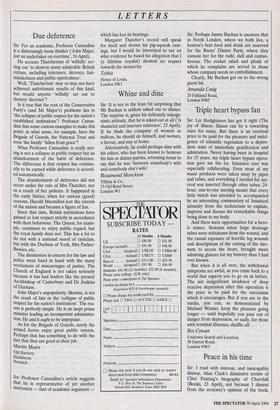LETTERS Due deference
Sir: For an academic, Professor Cannadine is a distressingly loose thinker ('John Major, Just an undertaker on overtime', 16 April).
He accuses Thatcherism of 'wilfully' set- ting out 'to destroy many admirable British virtues, including tolerance, decency, fair- mindedness and public-spiritedness'.
Well, 'Thatcherism' may or may not have achieved unfortunate results of this kind, but would anyone 'wilfully' set out to destroy 'decency'?
Is it true that the root of the Conservative Party's (and Mr Major's) problems lies in 'the collapse of public respect for the nation's established institutions'? Professor Canna- dine lists some curious examples to make this point: in what sense, for example, have the Brigade of Guards, the National Trust and even 'the family' fallen from grace'?
What Professor Cannadine is really not- ing is not a collapse in public respect but an abandonment of the habit of deference. The difference is that respect has continu- ally to be earned while deference is accord- ed automatically.
The abandonment of deference did not occur under the rule of Mrs Thatcher, nor as a result of her policies. It happened in the early Sixties, when for various (good) reasons, Harold Macmillan lost the esteem of the nation and became a figure of fun.
Since that time, British institutions have gained or lost respect strictly in accordance with their behaviour. The Queen, for exam- ple, continues to enjoy public regard, but the royal family does not. This has a lot to do not with a national mood of cynicism, but with the Duchess of York, Mrs Parker- Bowles, etc.
The diminution in esteem for the law and police went hand in hand with the many revelations of miscarriages of justice. The Church of England is not taken seriously because it has had leaders like the present Archbishop of Canterbury and Dr Jenkins Of Durham.
John Major's unpopularity, likewise, is not the result of fate or the 'collapse of public respect for the nation's institutions'. The rea- son is perfectly simple. He is an inept prime minister leading an incompetent administra- tion. He and it ought to be unpopular.
As for the Brigade of Guards, surely the armed forces enjoy great public esteem. Perhaps that has something to do with the fact that they are good at their job.
Martin Mears
Old Rectory, Haddiscoe, Norwich


























































 Previous page
Previous page